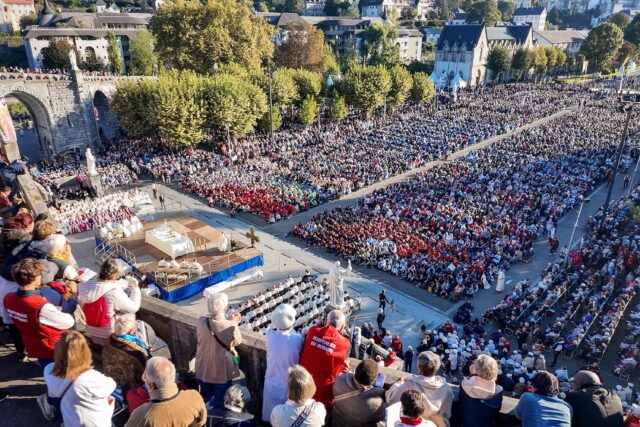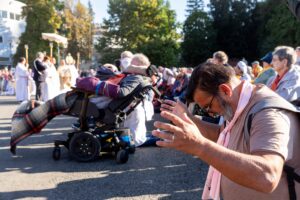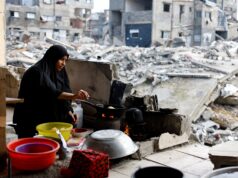
PARIS — Lourdes saw a record turnout for the annual Rosary Pilgrimage, with 17,000 pilgrims from Oct. 2–4 — the highest number since the Dominican-led event began in 1908.
Among them were 200 Dominicans, 3,000 young people and children, and 2,700 hospital employees, who cared for nearly a thousand sick and disabled people.
In addition to the traditional processions and ceremonies in Lourdes, the Rosary Pilgrimage offers numerous conferences and testimonials.
The main guest preacher was French Dominican Cardinal Jean-Paul Vesco of Algiers, who acquired Algerian nationality in 2023.
Cardinal Vesco came to Lourdes with around 30 Algerian Muslims.
“We had to overcome Himalayan difficulties to bring them here,” he said, explaining “the audacity of brotherhood” in his talk. He strongly emphasized the “discretion” that must surround the lives of Christians in Algeria, where Islam is the state religion.
“It is a special, very complex life that we lead in Algeria as Christians,” he explained. “It is a discreet life, but one that is an integral part of the citizenship and life of this country.”
Among Algerians who accompanied the cardinal was Khaled Boudaoui, who has prostate cancer. In his book, titled “Laps of Time,” published in France in April, he recounted his experience from the day doctors told him he had only four months to live in 2012. Since then, he has been training to run marathons.

“Khaled is a very dear friend, and he often invited me to join him for a run,” Cardinal Vesco recounted. “He was very keen to come to Lourdes with me. Our Christian hope goes beyond human hopes. Mine is nourished by witnesses in whom I see it alive, as I see it in Khaled.”
About 15 amateur actors were also in the group of Algerians. On Oct. 3, they performed a play in the sanctuary, where a special set had been built for them, representing the Cistercian monastery of Tibhirine, located in northern Algeria, in the Atlas Mountains.
The actors brought to the stage the tragedy of the seven Trappist monks, kidnapped on the night of March 26-27, 1996. They had their throats slit — their decapitated heads were found at the end of May in 1996. It is believed they were victims of the Armed Islamic Group, who were fighting the Algerian government, but there is no certainty who is really responsible for the murder at a time of a gruesome civil war that killed some 200,000 people.
“This is the first time that Algerians have written and staged this subject,” Cardinal Vesco noted, referring to the fact that this tragedy remains an extremely sensitive subject in Algeria, as the role of the authorities at the time has not been fully clarified.
This emotionally charged play is titled “A Friend of the Last Minute,” in reference to the famous “spiritual testament” of Father Christian de Chergé, the superior of the monks of Tibhirine.
Sensing the danger of being killed by an Islamist extremist, he had written a letter to his younger brother, telling him that he was “giving his life to God and to this country.” In this text, he addressed his future attacker, calling him “the friend of the last minute, who will not have known what you were doing.”

For Cardinal Vesco, Father de Chergé, who was beatified in 2018 along with the other monks, is a model of the “brotherhood” to which Christ invites Christians.
In front of a very large audience, he recounted that the prior of Tibhirine had written this spiritual testament in December 1993, when he had received a visit on Christmas Eve from the leader of an Islamist commando unit who had come looking for a doctor.
The commando unit had just murdered 12 Croatian Christians who were working on a nearby construction site.
“Father de Chergé spoke to him about the monastery as a house of peace into which he could not enter with weapons,” Cardinal Vesco recounted. “He told him about the celebration of the birth of the Prince of Peace, and the armed leader ended up apologizing for disturbing.”
“He had succeeded in creating a relationship of brotherhood despite the tension and danger of this exchange,” Cardinal Vesco commented.
“This is an extraordinary testimony for us. If we are brothers only to our Christian brothers and sisters, we are not Christians. Christian brotherhood must strive for universal brotherhood, regardless of any affiliation,” he said. “This transcendence is due to the person of Christ himself, who made us brothers to all our brothers, without setting any limits.”












